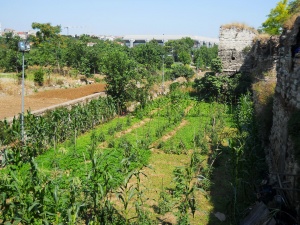 It’s worthwhile to heed the “eco-washers” and other insincere marketers, but to completely overlook the harm in certain chemicals is to do a disservice to the community.
It’s worthwhile to heed the “eco-washers” and other insincere marketers, but to completely overlook the harm in certain chemicals is to do a disservice to the community.
We are as quick to take eco-washing to task as any rabid consumer. Earlier this year, we called out Foster & Partners for their “sustainable” architecture, which is only sustainable for maybe the next few years. And we are willing to take a critical view of vegetarianism and sustainable fishing – both practices that we promote but that are controversial issues in the blogosphere. However, we don’t have a lot of patience for the naysayers who blithely publish erroneous information that threatens to undo years of campaigning for better health for everyone.
Di hydrogen Monoxide
Writing for Hurriyet Daily News in a tone more appropriate for a fledgling high school paper, John Laughland published a piece disparaging critics of chemicals.
“Do you know that those tomatoes or cucumbers you had yesterday have been liberally sprinkled with Di hydrogen Monoxide for the entire life of the plant and that substantial volumes of the same chemical are absorbed by the fruit? Consumption of the fruit leads to the absorption of the chemical into the human body and all our major organs, including the brain, contain a high percentage of it,” he wrote.
He is leading readers who may have forgotten the scientific names for basic chemicals to have a sudden spike in their blood pressure readings. Anything foreign or strange can appear threatening. At least, Laughland appears to hope that is the case.
Then he says, “Heaven forbid that we have our food contaminated by Sodium Chloride or Acetic, Tartaric or Citric Acid.”
Excalibur
And then, like Arthur pulling out his famous sword Excalibur, Laughland brings us to his sweeping point:
“The first chemical quoted [Dihydrogen Monoxide] is water, the second is salt and the third, forth and fifth are the components of vinegar. Understand this please folk. Our entire universe is made up of chemicals, organic or in-organic. Some are good in our food and some are not. The “Eco” or “Bio” nuts who condemn the use of “chemicals” per se should first get their basic chemistry sorted,” he said.
It’s a clever way to rile up his fellow naysayers, but Mr. Laughland left out some crucial commentary.
In 2003, only 0.4% of Turkey’s agricultural land was committed to farming organically. This may have increased since then, but that year, only 300,000 tonnes of produce was grown without the use of synthetic inputs.
America’s Food and Drug Administration defines organic agriculture as such:
Organic agriculture is a holistic production management system which promotes and enhances agro-ecosystem health, including biodiversity, biological cycles, and soil biological activity. It emphasises the use of management practices in preference to the use of off-farm inputs, taking into account that regional conditions require locally adapted systems. This is accomplished by using, where possible, agronomic, biological, and mechanical methods, as opposed to using synthetic materials, to fulfill any specific function within the system.
To be fair, Mr. Laughland points out that all things “eco” tend to have a higher price tag. And it’s true, because it takes a little more ingenuity to work with, rather than against, nature. Partly because of costs and partly because people don’t understand how much more beneficial organic agriculture (operated faithfully) can be, Turkey’s organic market is still in its youthful stages; and then nearly 90% of it is exported to the European Union.
Chemicals to look out for
What Mr. Laughland fails to mention are synthetic pesticides that are used – other than the list he mentions that I’ve never seen anyone dispute, except to use less salt to keep blood pressure down.
The Pesticide Action Network in the UK lists 32 active ingredients in harmful pesticides. I will do you the favor of only including only two, just to give you a taste of what is available.
2,4-D and chronic effects
Long-term exposure to 2,4-D has resulted in nervous system effects in humans and animals.18-20 Exposure to large amounts causes stiffness of the limbs21,22 and damages the liver and kidney.13 Hepatitis and a form of sclerosis have been observed in persons exposed to lawn pesticides.23,24 2,4-D has been found to have an effect on the immune and endocrine systems in tested animals,25-27 and there is evidence that 2,4-D causes birth defects and affects reproduction both in animals and humans.28-30 Harmful effects on development have been observed in animals.31-33
LD50
Like many insecticides and acaricides, dicofol is a nerve poison. The exact mode of action is not known, although in mammals it causes hyperstimulation of nerve transmission along nerve axons (cells). This effect is thought to be related to the inhibition of certain enzymes in the central nervous system(12).
Symptoms of ingestion and/or respiratory exposure include nausea, dizziness, weakness and vomiting; dermal exposure may cause skin irritation or a rash; and eye contact may cause conjuctivitis. Poisoning may affect the liver, kidneys or the central nervous system. Very severe cases may result in convulsions, coma, or death from respiratory failure(13).
What I don’t want readers to do is run to their local farmer and accuse them of poisoning them with toxic ingredients. Nor do I have any evidence that Turkey’s farmers are using these chemicals, though I would hazard a guess that some choice insecticides are being used to keep the critters at bay.
However, it is important that we are aware of that some chemicals do exist that are not only poisonous, but also disrupt biodiversity. To dismiss all chemicals then is irresponsible at best.
:: image via sirgabe and story via Hurriyet Daily News
More Food and Health News:




Absolutely.
Ja. OK, but not great 🙂
You are right though: many people might not know better. Which is why I think it is so important to distinguish between good and bad chemicals.
OK, you may have a point regarding his style, but as far as content is concerned I read it as OK. Nowhere does he suggest that no chemicals are OK, only that not all are to be shunned. In my own experience I’d say that on this subject by no means are all readers are educated and I think that is his point.
The problem I had with those points is that they have nothing to do with how he started the piece: he started out by making light of water being used to grow produce, whereas the “chemicals” he mentions later on – like aspirin – are so benign compared to chemicals sometimes used to keep pests and fungus off the food we eat.
A truly balanced article would have at least mentioned some harmful agricultural chemicals.
I also really didn’t appreciate the condescending and disparaging tone. It’s so much better to assume your readers are educated.
This piece completely ignores the author Laughlan’s few bows towards the green movement including his closure, something along the lines of “Don’t get me wrong, I am against the indiscriminate use of chemicals, but don’t dismiss “chemicals” per sey as being harmful.” Then something about their use in his town to kill snakes and scorpions [which he opposes]and you also failed to point out that he alleged [perhaps for effect] that some chemicals keep him alive. Be fair, it is a balanced piece.